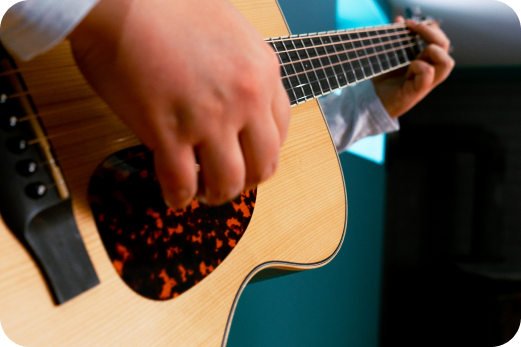What is Music Therapy?
Music Therapy been researched and has been proven effective at a national and international level.
Music therapy is a discipline in which Certified Music Therapists (MTAs) use music purposefully within therapeutic relationships to support development, health, and well-being. Music therapists use music safely and ethically to address human needs within cognitive, communicative, emotional, musical, physical, social, and spiritual domains.
Canadian Association of Music Therapists
September 2020

What is Neurologic Music Therapy?
Neurologic Music Therapy is a research-guided clinical model that is driven by advances in neuroscience and the understanding of the perception, production, and performance of music and how music can influence and change non-musical brain and behavior function.
Neurologic Music Therapy is the therapeutic application of music to cognitive, sensory, and motor dysfunctions due to neurologic disease of the human nervous system. It is for any population including stroke, traumatic brain injury,
Parkinson’s and Huntington’s disease, cerebral palsy, Alzheimer’s disease, autism, mental health, and other neurological diseases affecting cognition, movement, communication, and psychosocial function.
The Academy of Neurologic Music Therapy
Neurologic Music Therapy is an additional professional music therapy training that is used by Kadence Music Therapy to provide clients with advanced music therapy services.
Examples of Client Populations
But not limited to
Alzheimer’s/Dementia
Stroke
Brain Injury
Parkinson’s Disease
Palliative Care
Speech Disorders
Developmental Disabilities
Autism Spectrum Disorder
Down Syndrome
ADHD
Depression
Anxiety
What is Neurologic Music Therapy?

Recalling memories, learning new information, reinforce and modify desired behaviours, attention to task, and spatial awareness.

Improving speech functional and expressive language, facilitate speech production; improve speech endurance, and improve verbal and non-verbal emotional expression.

Enhance well-being, improve body awareness, self-regulation skills, awareness of others and the environment, and foster independent living.

Improved self-esteem and self-image, learning coping strategies, decrease anxiety, elevate mood, increase motivation, foster creativity and self-expression.

Improve fine and gross motor skills, range of motion, balance, flexibility, hand-eye coordination, muscle strength.

Improve social skills, impulse control, sharing, eye contact, decrease feelings of isolation and increased involvement in a group setting.
IMPROVES INVASIVE PROCEDURES
Those who listened to music in the operating room reported less discomfort during their procedure. Hearing music in the recovery room lowered the use of opioid painkillers.
RESTORES LOST SPEECH
Listening to music reduces anxiety associated with chemotherapy and radiotherapy. It can also quell nausea and vomiting for patients receiving chemotherapy.
REDUCES SIDE EFFECTS OF CANCER THERAPY
Music therapy decreases pain perception, reduces the amount of pain medication needed, helps relieve depression, and gives people a sense of better control over their pain.
AIDS PAIN RELIEF
Because the ability to engage with music remains intact late into the disease process, music therapy can help to recall memories, reduce agitation, assist communication, and improve physical coordination.
IMPROVES QUALITY OF LIFE FOR DEMENTIA PATIENTS
Music therapy can help people who are recovering from a stroke or traumatic brain injury that has damaged the left-brain region responsible for speech. Because singing ability originates in the right side of the brain, people can work around the injury to the left side of their brain by first singing their thoughts and then gradually dropping the melody.
Frequently Asked Questions
Music therapists use a variety of musical interventions. Musical interventions include, but are not limited to:
- Singing / Vocalizing
- Movement to Music
- Rhythmic Based Activities
- Musical Improvisation
- Instrument Play
- Listening to Music
- Songwriting / Composing
- Relaxation Techniques
- Music Discussion
